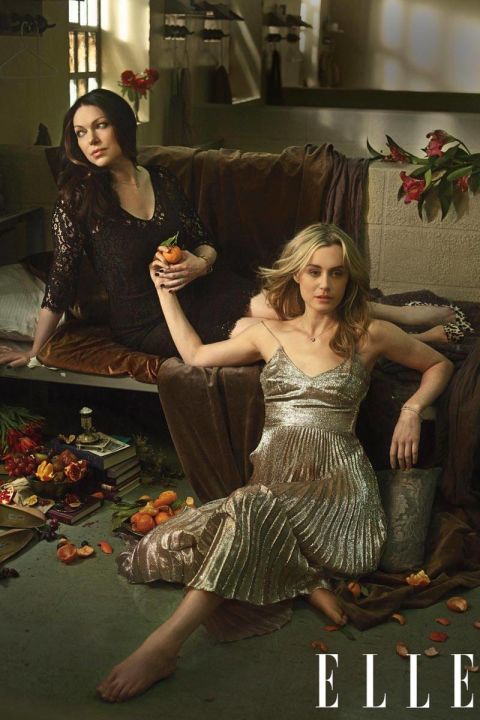Not Sorry: Orange is the New Black and Guilt
“I always think of her as a spider,” Laura Prepon says of her Orange is the New Black character, Alex Vause, in an interview for Elle magazine. Or, we might say, a snake. The show certainly presents Alex Vause as a temptress, the piece of fruit that convinced good-girl Piper Chapman to jump from grace.

Image Credit: Elle
This narrative is echoed in Elle Magazine’s photo shoot for second season of OitNB, a beautifully-produced, stunning take on the show itself. On one hand, the spread of photos glams up the all-female cast, showing us what they “really” look like outside their prison uniforms—a strange bit of rhetoric in itself, as these images are equally as well-lit, positioned, and directed as the show itself. Still, they’re telling a parallel but different story.
Here, Piper and Alex (or Taylor Schilling and Laura Prepon? hard to say) recline in a prison bunk, surrounded by edenic-looking fruit and flowers. Together, they clasp a piece of fruit between them, while Piper looks angelic and Alex looks scheming. If the Biblical story of the Fall can be said to essentially punish female sexuality, this image takes that morality and runs with it. Here, it’s not simply female sexuality, but disobedience being celebrated. The prison bunk in the background has been remade into a love nest, renovated for the purpose of acting out the age-old script. The disobedience was no accident, it suggests, and no one is sorry.
The show, then, and by extension this image, hopes to offer us a diverse, nuanced femininity. What strikes me, though, is that the women in this image are still surrounded by the prison. A hint at the limits to this female utopia? Or a nod to the guilt culture associated with falling from grace? The show gives Piper a healthy amount of guilt. She blames Alex (mostly) for her youthful, drug-muling mistake. Still, she takes up with Alex all over again, seemingly unable to resist the lure of the spider woman: “I hate that she has this hold over me,” Piper says in “Little Mustachioed Shit” (s02e10). Piper didn’t eat the fruit; she was hypnotized.
Although none of the show’s text or subtext (that I can recall, anyway, after my two viewings) casts Piper as an Eve-figure, this image works as a kind of visual commentary, asking us to interrogate the mechanism of guilt. In a world where every woman is guilty, new standards of morality pop up. “Girl, I am the criminal element, and so are you,” snorts an angry Watson in It Was the Change (s02e12). Poussey, reprimanding Watson for dealing drugs, seems not to consider herself or Watson the “real” criminals, despite the fact that she herself was convicted for dealing marijuana. Her infraction hasn’t resulted in true guilt; the assignation of real guilt falls on serious offenders, like Vee. I'm interested in how a show that does so much work to humanize criminals dramatizes guilt. Is the show dividing the women into temptresses and temptees? How does morality operate in an institution for rule-breakers? What is the show saying about honor among thieves, so to speak? (Oh, and what do we make of those books under Alex’s bed?)
Furthermore, what do these images of guilt do for the gender politics of a show that has been criticized for its portrayal of men? What do these glammed-up Elle images offer to the progress of feminism? The women are certainly made more conventionally beautiful here, with Alex and Piper beautifully staged for the consumption of the male gaze. Still, I wonder if the manipulation of the function of guilt in both the show and this photograph have any subversive purpose. What is the use of the edenic twist? Is the vaguely MRA-sounding critique of the men in Orange valid, or is the show giving us a limited but productive female gaze?



Add new comment